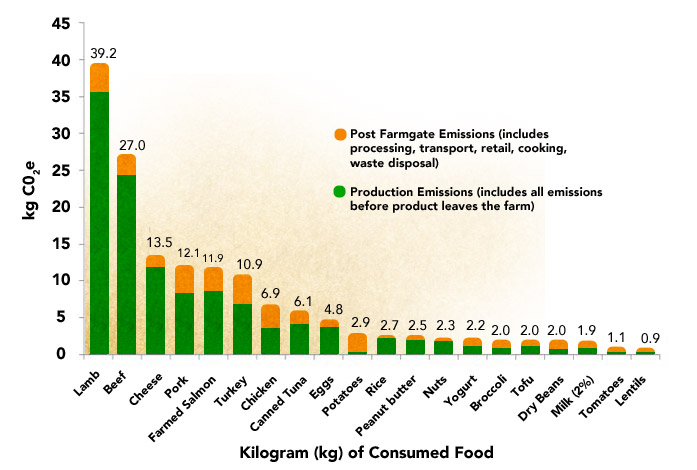I love beef. Hamburgers, steaks, corned beef, beef rendang, pastrami, meatballs… I could just keep going.
Other meats too: lamb, chicken, pork. Love 'em all.
But I also love living on this planet, and would like this planet to stay beautiful, ecologically diverse and healthy forever.
So I'm making some small changes for myself and the planet.
It's becoming clear to me that our eating habits make up are a large proportion of our impact on the Earth. As a top predator on the food chain, our food choices effect every other creature down the line, from livestock close to home, to wildlife in Africa, to fish in the open ocean. One scientist even suggests that eating less beef would have a more positive impact on the environment than not driving a car.
Lots of different food choices can have an impact on the environment and ourselves. Eating organic, going vegetarian, eating only locally grown foods, and eating non-GMO foods are choices that lots of people I know are making.
For me, I'm choosing to eat less meat and in particular less beef.
The research seems to overwhelmingly support cows, and in particular factory-raised cows, as being a huge part of the problem. A recent study published in the National Academy of Sciences has found that beef puts a much great burden on our resources than other protein sources, requiring 28 times more land and 11 times more irrigation water than pork, chicken, dairy or eggs on average. The Environmental Working Group studied the lifecycle impacts of different protein sources on greenhouse gasses and found that lamb and beef far worse than all other protein sources. But lamb is consumed so much less than beef in this country, so the effects of beef production are far more damaging to the earth.
This chart from EWG shows the greenhouse gas emissions produced by different crops and livestock, expressed as kilograms (kg) of carbon dioxide equivalents (CO2e) per kg of consumed product. Lamb has the greatest impact, generating 39.3 kg (86.4 lbs) of carbon dioxide equivalents (CO2e) for each kilo eaten – about 50 percent more than beef. Beef has the second-highest emissions, generating 27.1 kilos (59.6 lbs) of CO2e per kilo consumed. That’s more than twice the emissions of pork, nearly four times that of chicken and more than 13 times that of vegetable proteins such as beans, lentils and tofu. About 30 percent of the meat consumed in America is beef.
Suddenly a turkey burger is looking a lot more appetizing.
Given all this, I've decided to make two small, and frankly, easy changes to my eating habits. First, I'm cutting way back on my beef and lamb consumption to just for special occasions. And when I do eat it, choosing grass-fed, organic beef or lamb.
And second, I'm going to go meatless one day a week.
The impact on my life is so minimal and the change is so easy, it's kind of embarassing. But these two small changes will help me reduce my impact on the environment, and put me down the path of doing more significant changes down the line. As an educator at an institution whose mission is to "Explore, Explain and Sustain Life," its the least I can do to help fulfill our mission and set a decent example for our young people.
(And I still get to eat bacon.)
